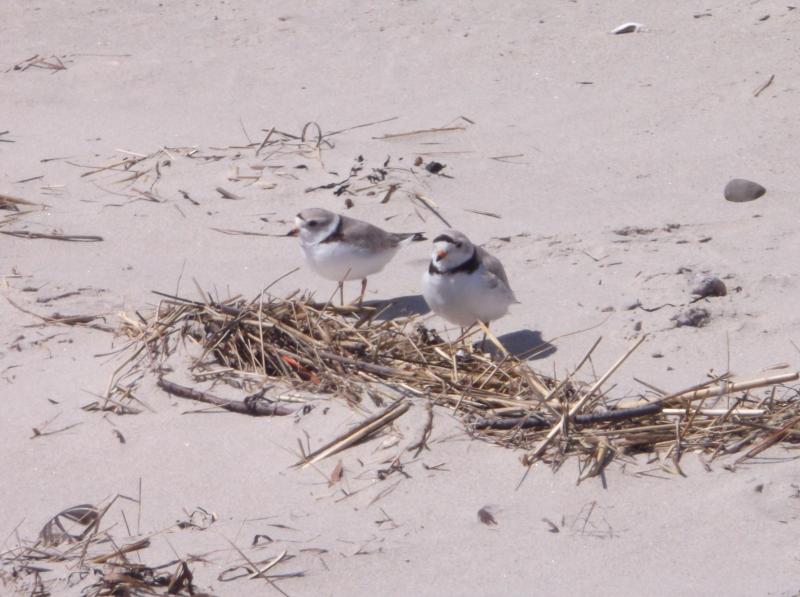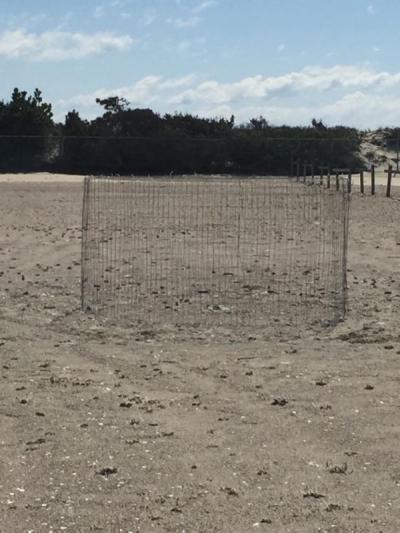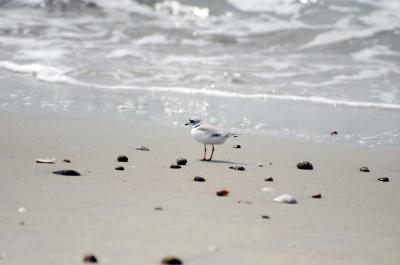Plover Nests With Predator Exclosures Prevail at Bakers Beach & West Island
Shorebird Mid-Season Update 2020 by Jamie Bogart, Lloyd Center Research Associate
One question entering this plover season was how the issue of a weary public waiting to break free onto their favorite beach might impact shorebird protection, whereby extensive beach must be secured to ensure the nests are protected adequately. Since that time, people have “adapted” to the idea of distance and spacing, delayed and conditional openings, and reduced capacities, including at some popular beaches. Although things are different at some sites, beaches are open and at some sites not much has changed.
One impact of the closures has been an unusual peace provided to wildlife, where people across the country have been documenting animals roaming in areas where they aren’t often seen. This certainly includes wildlife which are natural predators to Piping Plover nests, such as coyotes and foxes, mammals that have vast territories. However, these are animals we know have become increasingly accustomed, and even attracted to our presence, so on beaches where access has not been limited, one would think the animals haven’t missed a beat.
This is certainly true at West Island in Fairhaven, where a variety of predators live, including coyotes and foxes, which have become an increasingly common sight in broad daylight on the island and along Sconticut Neck. The peninsula, including the island, has extensive forest and salt marsh habitat through which animals can roam, along with a high density of housing that also may attract the interest of roaming mammals. In addition, all roads on the peninsula lead to the island, which is arguably the most pristine location on Sconticut Neck. While the island continues to support a relatively dense population of Piping Plovers (eight pairs this season, down from twelve last year), this effectively is also a buffet of eggs for a hungry fox or coyote.
Unfortunately (but naturally), nest lost has been high this season, with all but two pairs forced to re-nest after losing the first clutch to predators, a combination of coyote and fox. The first pair to lose its nest actually abandoned the clutch, a rarity for an unexclosed nest, but the eggs were laid close to the forest edge, which was clearly a travel corridor for a variety of predators. Recently, after the eggs sat for some time, crow took the clutch, crow being another formidable foe on the island, and throughout the range of the Piping Plover. The one unexclosed nest to hatch occurred on a small isolated beach on state property north of the inlet to the marsh, with predator activity more concentrated on the side of the channel routinely accessed by beach goers, and which includes the town beach.
After losing all nests on the small sand spit near the parking area last season, and predators gradually inching closer to that area, the decision was made to exclose the nest with a metal cage. This continues to be a risky operation due to risk of abandonment, being that the nest attracts the attention of both the predators and the public. However, we’re pleased to report this nest hatched four chicks, all alive and well as of the most recent visit. Also, most pairs have remained on the island for another attempt, with another exclosure on the town beach a possibility (nest location is an important factor when deciding whether or not to exclose). We’re hopeful for a few more broods of chicks before the season winds down in August.
At Bakers Beach, the parking lot pair continues to impress, and returned to nest in the same nest depression used last season. This is also the one plover pair in Bristol County that almost always receives an exclosure and has produced hatchlings from an exclosed nest for a third consecutive year. Four hatchlings emerged on June 5 and have reached the waterfront. The owners continue to make a huge sacrifice of parking spaces in order to protect the pair, and we hope all four survive to fledge!
With the summer season upon us, we remind the public to enjoy the presence of the birds through observation without disturbing them. This means not entering refuges, securing dogs which can crush eggs or chase and capture birds, and not attempting to handle young hatchlings which can cause mortality, and is also highly disturbing to the adults. A roaming plover chick, while perhaps appearing lost, is being watched by a parent and is likely looking for food in the intertidal zone. Please allow the chicks their feeding space, so they can survive to fledge and fly south at season’s end.
Stay tuned for the shorebird wrap-up later in the summer!














